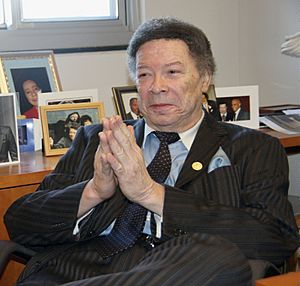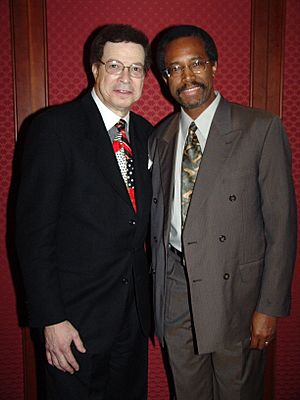Levi Watkins facts for kids
Quick facts for kids
Levi Watkins
|
|
|---|---|

Watkins in 2013
|
|
| Born | June 13, 1944 Parsons, Kansas, U.S.
|
| Died | April 11, 2015 (aged 70) Baltimore, Maryland, U.S.
|
| Alma mater | Tennessee State University Vanderbilt University Medical School |
| Occupation | Heart surgeon, civil rights activist |
| Parents |
|
| Relatives | Annie Marie Watkins Garraway (sister) Levi Garraway (nephew) |
Levi Watkins Jr. (June 13, 1944 – April 11, 2015) was an American heart surgeon. He was also a strong civil rights activist. On February 4, 1980, he and Vivien Thomas made history. They were the first to successfully put an automatic defibrillator into a human patient. This happened at Johns Hopkins University.
This amazing device helps millions of people today. It finds irregular heartbeats and fixes them. Dr. Watkins was known for being determined and caring. He used his passion to help minorities in medicine. His ideas still inspire people to make medical schools more diverse.
Contents
Early Life and Education
Levi Watkins Jr. was born in Parsons, Kansas. His parents were Levi Watkins Sr. and Lillian Varnado. He grew up with five brothers and sisters. His family later moved to Montgomery, Alabama. His father became the president of Alabama State College. His mother was a high school teacher.
As a child, Watkins was baptized by Ralph Abernathy. Reverend Abernathy was a civil rights leader. He worked closely with Martin Luther King Jr.. Watkins was a top student. He was the valedictorian of his high school class.
A biology professor at Tennessee State University inspired him. This professor encouraged him to study medicine. Watkins earned a biology degree from Tennessee State. Then, he went to Vanderbilt University School of Medicine. He was the first African American to get a medical degree from Vanderbilt. When he graduated in 1970, he was still the only Black student there.
Medical Career Highlights
Watkins began his medical training at Johns Hopkins Hospital in 1971. He became the chief resident of cardiac surgery. This made him the first African American chief resident at the university.
In 1980, he started working on the defibrillator. He made important improvements to this device. Dr. Watkins also improved techniques for open heart surgery. Many of these methods are still used today. He became a professor of cardiac surgery in 1991. He also served as an Associate Dean at the Johns Hopkins School of Medicine. He retired in 2013.
In 1993, his father needed heart surgery. Dr. Watkins performed the surgery himself. His family trusted him because he was an excellent surgeon. The surgery was a success.
Research on Angiotensin Blockers
From 1973 to 1975, Watkins worked at Harvard University. He researched angiotensin blockers. These drugs help people with heart failure. They were created to avoid side effects from older medicines. Watkins' research made these drugs safer and more effective. Today, these drugs still help many patients. They are especially useful for those who cannot take other heart medicines.
Civil Rights Activism

Watkins met Martin Luther King Jr.'s family through his church. He was only eight years old when he met King. From then on, he cared deeply about civil rights. He spent his life fighting for African Americans and other minorities. He wanted them to have more opportunities in medicine.
In 1955, when he was 11, he joined the Montgomery bus boycott. This happened after Rosa Parks' brave act. He also volunteered as a driver for Martin Luther King Jr. Later, he joined the admissions board at Johns Hopkins University. He worked hard to make the school fair for all students. Between 1978 and 1983, the number of African American students there grew five times!
Watkins also advised other important African American leaders. These included James E. K. Hildreth and Selwyn M. Vickers. Hildreth helped with AIDS research. Vickers became the first African American dean of the School of Medicine at the University of Alabama.
Death and Lasting Legacy
Levi Watkins Jr. passed away in Baltimore on April 11, 2015. He was 70 years old. Vanderbilt University honored him by creating the Levi Watkins Jr., M.D. Chair.
A special lecture series is also named after him. It's called the Levi Watkins Jr., M.D. Lecture on Diversity in Medical Education. It started in 2002 and happens every year at Vanderbilt. Students and teachers receive awards for helping minorities at the university. A plaque honoring his life is in Patterson Park in Baltimore.
Much of his work still helps people today. His improvements to surgical techniques and the defibrillator are still used. His research on angiotensin blockers also continues to treat many patients. Dr. Watkins' legacy lives on through his medical breakthroughs and his fight for fairness.
 | Laphonza Butler |
 | Daisy Bates |
 | Elizabeth Piper Ensley |

